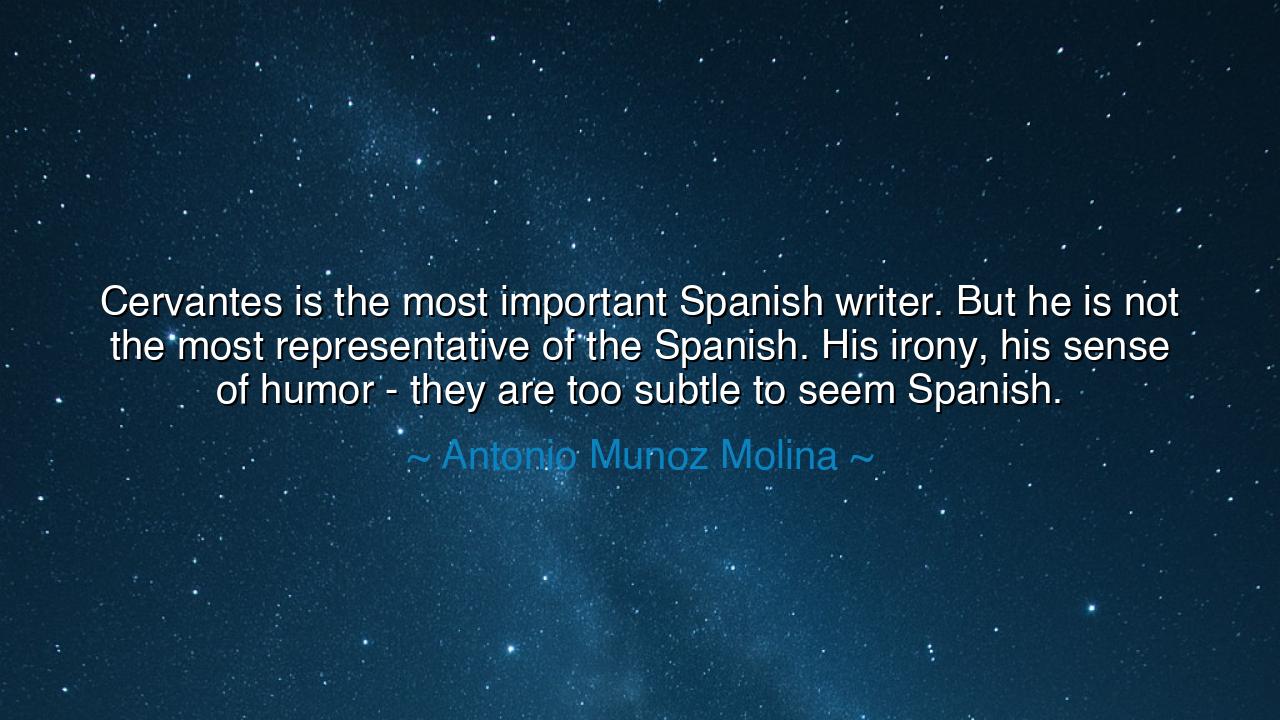
Cervantes is the most important Spanish writer. But he is not the
Cervantes is the most important Spanish writer. But he is not the most representative of the Spanish. His irony, his sense of humor - they are too subtle to seem Spanish.






In the vast annals of literature, there are those whose works transcend the boundaries of time and place, whose words echo across generations, shaping not just the culture in which they were written but the world itself. Cervantes, the master of the Spanish language, stands as one of these titans, his Don Quixote forever etched into the fabric of human thought. Yet, as Antonio Muñoz Molina so insightfully observes, "Cervantes is the most important Spanish writer. But he is not the most representative of the Spanish. His irony, his sense of humor—they are too subtle to seem Spanish." This reflection touches upon a paradox: while Cervantes’ genius is universally acknowledged, his irony and subtle humor challenge the very essence of the Spanish spirit as it is often conceived—a spirit that is more direct and forthright.
In the ancient world, where humor was often bold and unveiled, Cervantes' style would have seemed a curious thing indeed. Think of the great playwright Aristophanes, whose comedy was sharp and sometimes crude, using the boldness of humor to criticize the society around him. Aristophanes’ humor was unmistakably tied to the Greek identity—open, exaggerated, and often politically charged. Likewise, in many cultures, humor is a public expression, a force that can shape the direction of a society. Yet, Cervantes was not simply a product of his culture; he was a thinker, a man who understood that humor, when subtle, has the power to reveal truths that are too often overlooked. His irony was not for loud laughter, but for quiet reflection, allowing his readers to see themselves in the mirror of his wit, even as they laughed at the absurdity of his characters.
The irony in Cervantes’ work is a form of wisdom, one that transcends the typical borders of national identity. It is said that Cervantes was a man who had known both glory and defeat. He fought in the Battle of Lepanto, was captured by pirates, and spent years in prison, all of which gave him a deep sense of the contradictions inherent in life. Don Quixote is not just a tale of a mad knight; it is a story of humanity, of the struggle between idealism and reality, between the noble and the absurd. His irony, so deft and layered, holds up a mirror to human nature, forcing the reader to face the tragicomic aspects of life, where dreams and reality often collide in painful, but ultimately enlightening, ways. This is not the brash humor that some might expect from the Spanish, but a delicate critique of the human condition that speaks to something deeper and more universal.
Muñoz Molina speaks to the heart of this complexity: Cervantes' humor is not loud or obvious, but subtle, layered in such a way that it may be misunderstood by those who are used to more direct forms of humor. In this, Cervantes mirrors the ancient philosophers, such as Socrates, who used irony to reveal truth in a way that was not immediately obvious, but only understood through deep contemplation. Like Socrates, Cervantes employed a method of questioning, a type of verbal sparring that gently pricked at the accepted truths of his time. His humor, thus, is a tool of enlightenment, not just entertainment. It asks the reader to reflect, to look at life’s contradictions, and perhaps, like Don Quixote, chase after something impossible but ultimately meaningful.
This idea of subtle humor leads us to another ancient truth: the balance of wisdom and humor. In ancient Greece, Plato often used humor in his dialogues, especially in works like The Symposium, to bring forth serious philosophical discussions in a palatable and accessible manner. But this humor was not surface-level; it was carefully crafted, a vehicle for deeper inquiry. Cervantes, like Plato, understood that humor could be the gateway to truth, but it was a humor that required both a keen mind and a willingness to question. His irony, his subtle humor, invited his readers to see the world not as it was, but as it could be when viewed through a more nuanced lens.
As Muñoz Molina points out, Cervantes might not be the most representative of the Spanish spirit, but in his work, we find a reflection of the more complex and multi-layered nature of the human soul. The directness of national character does not always capture the full depth of a person’s inner world. Cervantes understood that the true human experience is not something that can be captured in simple, bold strokes, but in the subtle movements between laughter and sorrow, between dreams and disillusionment.
The lesson from Cervantes and Muñoz Molina is a profound one: humor, in its highest form, is not simply the laughter of the moment, but a reflection of humanity’s deeper struggles and truths. Whether in the tragic or the comic, the irony in Cervantes’ work urges us to look at life not just for its surface-level joys or sorrows, but for the complex dance between them. We, too, must learn to see humor not just as entertainment but as a reflection of the deeper currents of life. In our own lives, let us not shy away from the subtle humor that reveals life’s contradictions and imperfections, for it is through this understanding that we find not only laughter but wisdom. And in this, we honor the legacy of Cervantes, whose humor, though subtle, continues to guide and enlighten generations.






AAdministratorAdministrator
Welcome, honored guests. Please leave a comment, we will respond soon